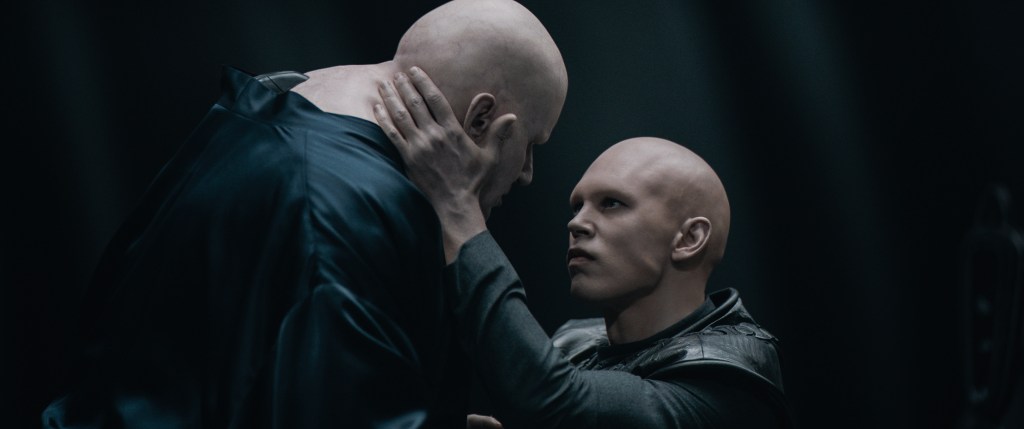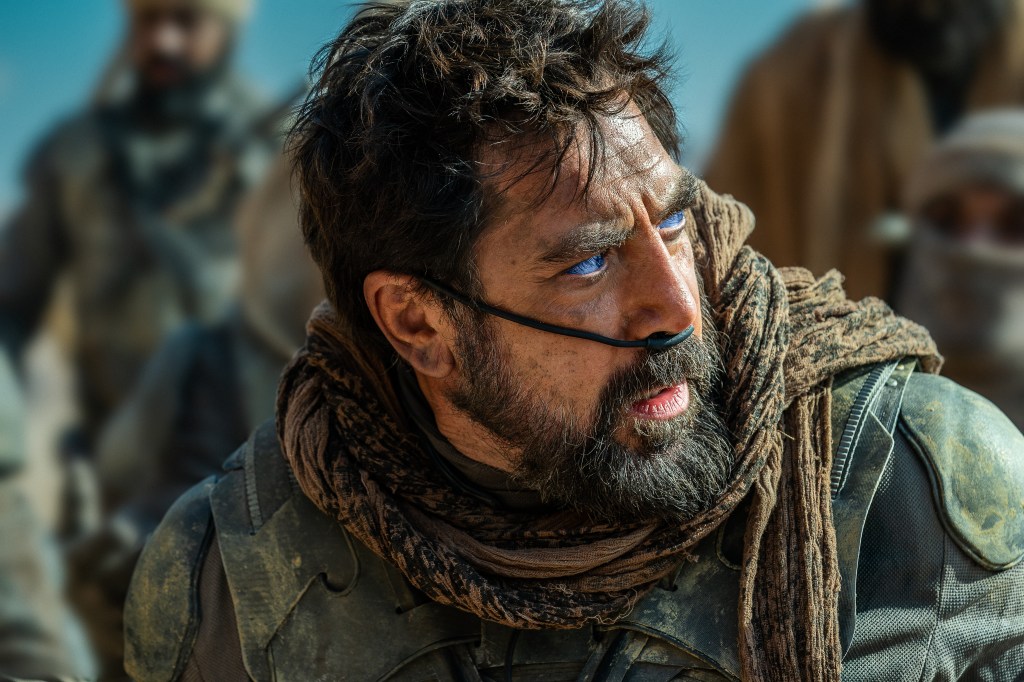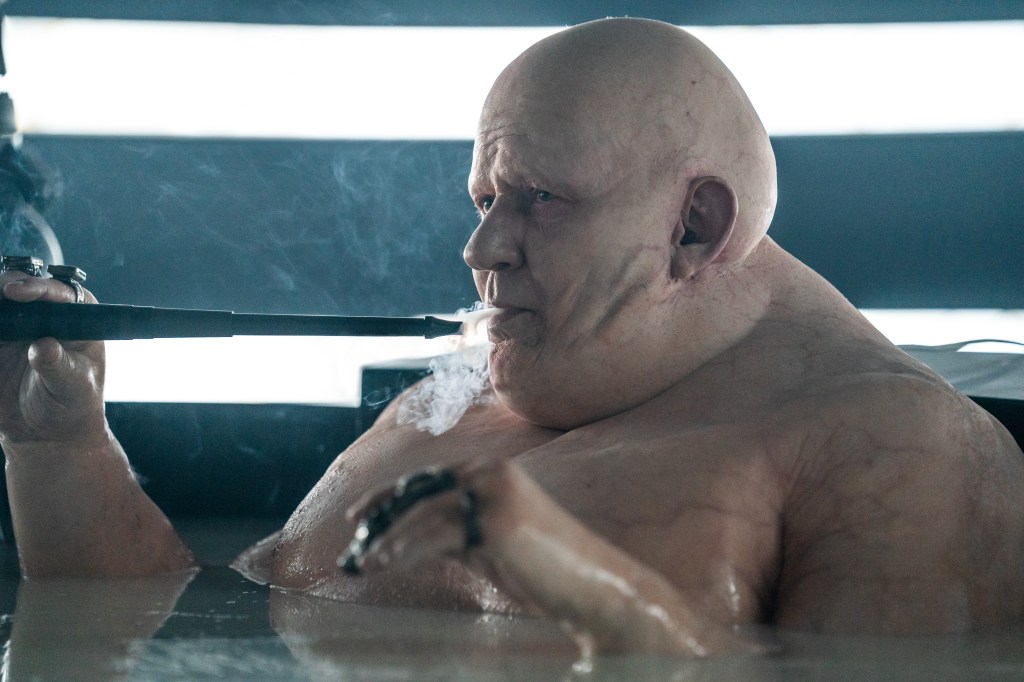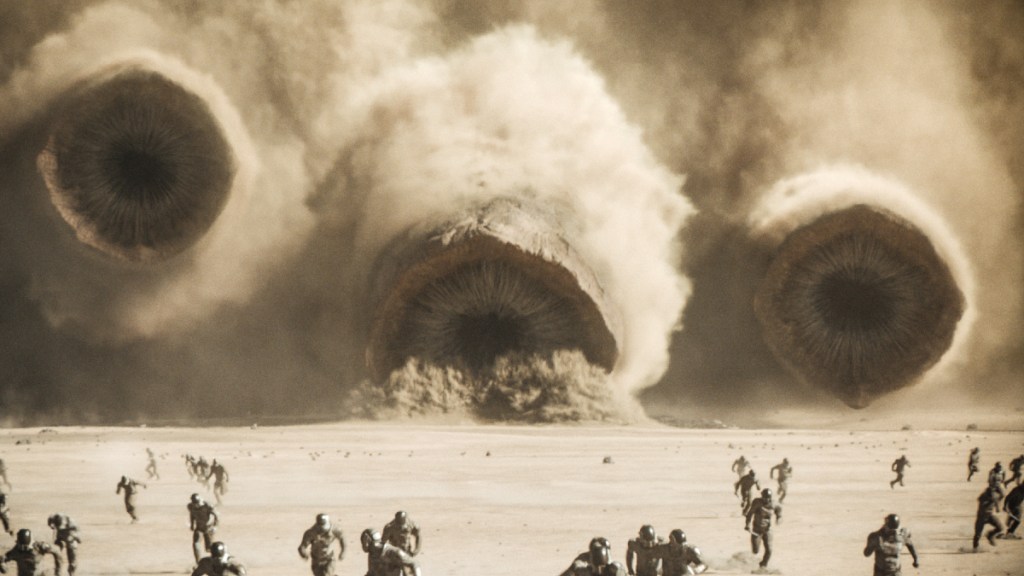The whole point of adapting the novel Dune with two films was, we thought, so that even if the first one ends on a cliffhanger, the second will provide proper closure, right? Right?
Insert the Anakin-Padme meme here. Not to spoil anything specific that you couldn’t already learn from a Frank Herbert novel published in 1965, but the moment director Denis Villeneuve started thinking out loud about making Dune a trilogy was likely the moment he decided on yet another stopping point rather than a conclusion. So brace yourself for that. Like the first, Dune: Part Two feels like part of a movie rather than a movie in itself. And that part sure as hell isn’t the climax.

The Worm Turns
If you want character development or explanations of why certain things in the plot are the way they are, go back and watch the first. There’s very little recap here, and the only characters who feel like they develop are all varying degrees of new. Zendaya’s Chani, briefly in the first, stands in as the voice of audience skepticism. This was not her role in the book, but perhaps for a movie version aimed at the masses and not just sci-fi readers, one of the characters has to call the space religions on their BS, and she hits the lottery.
Austin Butler steps into the role, if not the metal jockstrap, of villain Feyd-Rautha, formerly and memorably portrayed by Sting in the 1984 film. Though the actor who once embodied Elvis possibly could have out-cooled the Police frontman, he goes a different and hilarious direction. Being the nephew of Stellan Skarsgard’s Baron Harkonnen, Butler essentially does a Skarsgard impersonation the entire movie. It’s up there with Andrew Bryniarski’s Christopher Walken voice in Batman Returns as an all-timer, to-their-face star impersonation.

Speaking of Walken, he’s here too, ostensibly playing the emperor of outer space, but basically just doing his Walken thing to the max while clad in basic dressing gowns, like he just stumbled onto the stage out of the shower and didn’t notice he’s in a science fiction epic. In a Dune trying as hard as possible not to be a David Lynch film, Walken brings the most Lynchian touch, coming off incredibly weird for the setting just by doing what’s normal for him and HIS…distinctive cadence…
Meanwhile, in a Desert Far, Far Away…
Dune: Part Two picks up where the last one left off, with exiled royalty Paul Atreides (Timothee Chalamet) and his mother Lady Jessica (Rebecca Ferguson) captured by the desert nomad tribe called the Fremen, led by religious zealot Stilgar (Javier Bardem). Jessica’s intergalactic religious order, the Bene Gesserit, has spent generations seeding cultures with Messianic prophecies so that one day, via their own eugenics, they could create a Messiah who would match the scriptures and take on the role on their behalf. Paul wasn’t meant to be that Messiah — he came a generation too early — but Stilgar, who believes the prophecies are authentic, thinks he is. And if he is, he gets to stay with them, and his mother can be their Reverend Mother. But if he’s not, the Fremen have no use for them, and they’ll both be left for dead.

A better player of the game of space thrones than her son, Jessica instantly sees the value of presenting themselves as prophecy fulfilled and uses her spiritual and physical training to enhance that impression. Paul doesn’t want to take on the role but has no choice in the immediate moment; later, of course, he realizes that if he can mobilize all the Fremen with religion, he can avenge his father and easily conquer the Harkonnen family, who took control of planet Arrakis from him.
Tropes ‘n’ Dreams
Like John Carter of Mars, or Jake Sulley of Avatar, Paul’s initial strength comes not from being inherently extra-special — though he does develop some psychic powers — but that he’s well trained in a completely different fighting style from the locals, and when he can learn theirs too, and teach it back, everyone benefits. If it feels less like a white savior trope than usual it may also be because it’s not clear the path they’re on saves anyone from anything. The best thing about Dune: Part Two is just how cynical it is about religion and politics, though it doesn’t offer any great alternatives. Letting the Harkonnens keep running the place as greedy bastards doesn’t seem especially sustainable, yet overthrowing them risks interplanetary holy war.

Alia Jacta Est
In the midst of such major lose-lose decisions, Paul finds moments of peace and love with Chani, though it’s a much shorter timeframe than in the book, where two years pass and they have a child. The events of the movie take place over less than nine months, as evidenced by the fact that Paul’s unborn sister Alia remains a psychic fetus in the womb the entire time (just to be clear, we literally see her as such a few times). Thus, despite its general lack of respect for organized religion, Dune: Part Two should strongly find favor with pro-lifers. Is this more or less creepy than Lynch’s depiction of her as a prematurely born genius toddler? You decide.
There’s no shortage of beautiful images in the second Dune, from an early scene of Harkonnen warriors slowly floating up to higher ground to the various dreams and snippets Paul sees in his mind. Yet so determined is director Denis Villeneuve to satisfy fans of both epic action and the intrigue of power struggles that he ultimately hampers both at the expense of one another. The action, when it comes, is often chaotic and brutal, and sometimes confusing — did they really just use a nuclear weapon and come out of it mostly unharmed and cancer-free? And despite an over-two-and-a-half-hour runtime that feels every minute of it, the palace intrigue could have used more time to play out, like on a premium cable miniseries.

Her-bert, Her-bert!
As a result, it often feels like Paul does things more because the novel dictates that he should rather than any reason that’s fully justified by the onscreen narrative. His journey from romantic to brutal pragmatist seems to play out only in Chalamet’s head rather than in Villeneuve and Greig Fraser’s camera shots. Fans of the book will have an advantage; hell, even reading the Wikipedia synopsis makes things much clearer than the film does.
If you like the aesthetic of Dune so far, and you like cinematic spectacle, the movie should scratch that itch on a basic level. But when it comes to fully delivering on the promise of the first, well, once again we are left hanging. Like the Zack Snyder-verse, we may continue to wonder if the Villeneuve-verse would rather deliver a true finale or get years of free press from its director discussing what might have been.
Grade: 3/5
Dune: Part Two opens March 1st in theaters.





